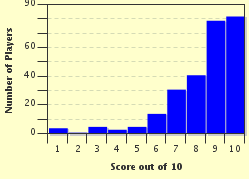Quiz Answer Key and Fun Facts
1. What does the Spanish phrase "como esta?" mean?
2. Most of us know that the "RSVP" at the end of each invitation asks us to reply or confirm attendance. But what does the acronym RSVP really stand for?
3. The 1989 movie "Dead Poets Society" helped popularize the English use of the Latin phrase "carpe diem". What is the translation of this phrase?
4. "Aloha", which can mean "hello", "welcome", "love", and "goodbye" is arguably the most famous Hawaiian word. Another often-used Hawaiian word is "mahalo". What does "mahalo" mean?
5. If someone told you that you had a "doppelganger", it means there's someone who looks a lot like you. From what language did the word "doppelganger" originate?
6. "Safari" is a word which emanated from Arabic and Swahili origins. What is the literal meaning of this word?
7. What does it mean when you hear someone did a "hara-kiri"?
8. What does the Italian word "arrivederci" literally mean?
9. The lyrics of the song "Lady Marmalade", originally performed in 1974 by the group Labelle and revived in 2001 for the movie "Moulin Rouge" by Christina Aguilera, Li'l Kim, Mya and Pink, has the French phrase "Voulez-vous coucher avec moi?" What does this phrase translate to in English?
10. Arguably the most popular Swahili phrase in common use is this phrase popularized by the 1993 Disney classic "The Lion King". According to the song, "...it means, 'no worries'" What is this phrase?
Source: Author
aircorwin
This quiz was reviewed by FunTrivia editor
stedman before going online.
Any errors found in FunTrivia content are routinely corrected through our feedback system.

